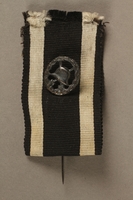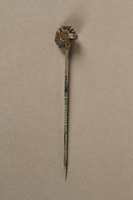Overview
- Description
- The Ruth Loewenstein papers consist of biographical materials, correspondence, and photographs documenting the Loewenstein family from Munich, the family haberdashery business called JKA, Willy Loewenstein’s military service during World War I, his imprisonment in Dachau following Kristallnacht, the family’s flight to England, their immigration to the United States, and their embroidered handkerchief business Wil-Low Handkerchiefs in America.
Biographical materials include identification papers, military papers, and immigration records documenting the Loewenstein family, Willy Loewenstein’s service during World War I, the family haberdashery business in Munich, their flight to England and immigration to the United States, and the sale of jewelry Annie hid in her daughters’ dolls so it would not be confiscated during the family’s departure from Germany.
Correspondence includes postcards and receipts from Willy as a prisoner at Dachau, Gestapo letters documenting Annie’s attempt to obtain Willy’s release from Dachau as a wounded World War I veteran and his subsequent obligation to attempt to emigrate, letters from Ruth and Marianne to their parents describing their life in Northampton, letters documenting Willy’s loss of German citizenship and veteran pension benefits when he emigrated to England, letters from Annie’s parents as they immigrated to the United States in 1941, and a letter from the Mitchell family who housed Ruth and Marianne during the blitz.
Photographs depict the Loewenstein family’s haberdashery store JKA in Munich, the Loewenstein family primarily before the war, and the Loewenstein’s American handkerchief business Wil-Low Handkerchiefs. - Date
-
inclusive:
1914-1963
- Credit Line
- United States Holocaust Memorial Museum Collection, Gift of Ruth Loewenstein
- Collection Creator
- Ruth Loewenstein
- Biography
-
Ruth Loewenstein was born in Munich, Germany in 1929 to Willy Loewenstein (1894-1957) and Annie Cahen Loewenstein (1902-1992) and had one younger sister named Marianne (“Janne,” 1932-2008). Willy Loewenstein served in the German Army during World War I, and his family owned a haberdashery store called JKA. Willy was arrested on November 10, 1938 during Kristallnacht, imprisoned in the Dachau concentration camp, and released in December 1938 on the condition that he would leave Germany. In March 1939 the Loewenstein family obtained entry visas to the United Kingdom, and they left Germany on July 25th, 1939. Ruth and Marianne carried hand sewn dolls their mother had given them and wore a tiny gold bracelet on their wrists. As they left Germany, the German guard tore off the bracelets but ignored the dolls, not realizing that the girls’ mother had hidden jewelry in the heads of each doll. During the blitz, Ruth and Marianne were evacuated to Northampton and lived with Ted and Elsie Mitchell and their son John, and Willy was interned as an enemy alien on the Isle of Man. The Loewensteins received US immigration visas on July 24, 1940, sailed from Glasgow to New York at the end of August aboard the SS Cameronia, and arrived in America on September 10. Their sponsors were cousins Bertha and Milton Oettinger. The Loewensteins lived in New York with relatives David, Lotte, and Margot Loewenstein; Henny, Meinhold, and Joseph Rothschild; and Willy’s mother Marianne Loewenstein. Willy and Annie sold the jewelry hidden in the dolls to pay for tickets to bring Annie’s parents, Gustav and Alice Cahen, from Havana to New York. The Loewensteins started a business in 1945 creating and importing embroidered handkerchiefs from Switzerland. Marianne Loewenstein married Harold Hammerschlag in 1954 and had three children.
Physical Details
- Genre/Form
- Photographs.
- Extent
-
1 box
1 oversize folder
- System of Arrangement
- The Ruth Loewenstein papers are arranged as three series:
I. Biographical materials, 1914-1956
II. Correspondence, 1920-1941
III. Photographs, approximately 1920-1963
Rights & Restrictions
- Conditions on Access
- There are no known restrictions on access to this material.
- Conditions on Use
- Material(s) in this collection may be protected by copyright and/or related rights. You do not require further permission from the Museum to use this material. The user is solely responsible for making a determination as to if and how the material may be used.
Keywords & Subjects
Administrative Notes
- Holder of Originals
-
United States Holocaust Memorial Museum
- Legal Status
- Permanent Collection
- Provenance
- Ruth Lowenstein donated the Ruth Loewenstein papers to the United States Holocaust Memorial Museum in 2017.
- Record last modified:
- 2023-02-24 14:32:23
- This page:
- https://collections.ushmm.org/search/catalog/irn592780
Additional Resources
Download & Licensing
In-Person Research
- Available for Research
- Plan a Research Visit
-
Request in Shapell Center Reading Room
Bowie, MD
Contact Us
Also in Ruth Loewenstein collection
Doll: handmade by Annie Loewenstein (donor's mother) in Munich, Germany. The Loewenstein family: Willy (donor's father) [b. 1894], Annie [b. 1904], Ruth (donor) [b. 1929], and Marianne (donor's sister) [b. 1932], were able to leave Germany in August 1939 for England. Ruth and Marianne were wearing thin gold bracelets on their wrists and each carried a doll. The German guard at the Dutch border tore off the bracelets, but did not pay any attention to the dolls. Upon arrival in New York on September 10, 1940, Annie took the heads off the dolls, in which she had hidden valuables. She sold the valuables and used the money to rescue her parents from Germany. Also included in the collection are additional clothing for the doll and "Kleine Bibel" a children's Bible carried by Ruth from Munich. Collection of photographs and documents relating to the Loewenstein family in Munich, Germany. The collection includes among other items, postcards written in the Dachau concentration camp; Kennkarten of the members of the family; German passports marked with the red letter "J"; family correspondence relating to emigration from Germany and other correspondence; family photographs depicting the family's ladie's lingerie stores and family photographs; Military pins received by Willy Loewenstein after his military service during WWI; Transferred to USHMM Library: Book: memorial book to Jewish soldiers who fell in WWI while serving with the German Army; Hanger: with engraved name "A. Loewenstein, Rotenburg"
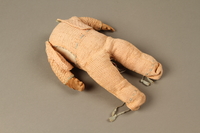
Headless doll with detached eyeballs, bonnet
Object
Cloth doll wearing pink knit clothing, handmade by Annie Loewenstein (donor's mother) in Munich, Germany. The Loewenstein family: Willy (donor's father) [b. 1894], Annie [b. 1904], Ruth (donor) [b. 1929], and Marianne (donor's sister) [b. 1932], were able to leave Germany in August 1939 for England. Ruth and Marianne were wearing thin gold bracelets on their wrists and each carried a doll. The German guard at the Dutch border tore off the bracelets, but did not pay any attention to the dolls. Upon arrival in New York on September 10, 1940, Annie took the heads off the dolls, in which she had hidden valuables. She sold the valuables and used the money to rescue her parents from Germany. Also included in the collection are additional clothing for the doll and "Kleine Bibel" a children's Bible carried by Ruth from Munich.
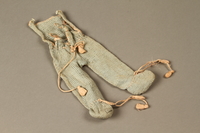
Doll overalls and sweater set
Object
Light green yarn overalls and sweater set for a doll handmade by Annie Loewenstein (donor's mother) in Munich, Germany. The Loewenstein family: Willy (donor's father) [b. 1894], Annie [b. 1904], Ruth (donor) [b. 1929], and Marianne (donor's sister) [b. 1932], were able to leave Germany in August 1939 for England. Ruth and Marianne were wearing thin gold bracelets on their wrists and each carried a doll. The German guard at the Dutch border tore off the bracelets, but did not pay any attention to the dolls. Upon arrival in New York on September 10, 1940, Annie took the heads off the dolls, in which she had hidden valuables. She sold the valuables and used the money to rescue her parents from Germany. Also included in the collection are additional clothing for the doll and "Kleine Bibel" a children's Bible carried by Ruth from Munich.
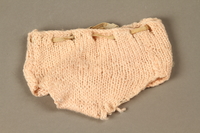
Doll undergarment
Object
Light pink yarn underpants for a doll handmade by Annie Loewenstein (donor's mother) in Munich, Germany. The Loewenstein family: Willy (donor's father) [b. 1894], Annie [b. 1904], Ruth (donor) [b. 1929], and Marianne (donor's sister) [b. 1932], were able to leave Germany in August 1939 for England. Ruth and Marianne were wearing thin gold bracelets on their wrists and each carried a doll. The German guard at the Dutch border tore off the bracelets, but did not pay any attention to the dolls. Upon arrival in New York on September 10, 1940, Annie took the heads off the dolls, in which she had hidden valuables. She sold the valuables and used the money to rescue her parents from Germany. Also included in the collection are additional clothing for the doll and "Kleine Bibel" a children's Bible carried by Ruth from Munich.
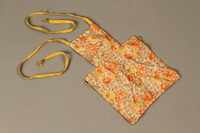
Doll apron
Object
Floral patterned apron for a doll handmade by Annie Loewenstein (donor's mother) in Munich, Germany. The Loewenstein family: Willy (donor's father) [b. 1894], Annie [b. 1904], Ruth (donor) [b. 1929], and Marianne (donor's sister) [b. 1932], were able to leave Germany in August 1939 for England. Ruth and Marianne were wearing thin gold bracelets on their wrists and each carried a doll. The German guard at the Dutch border tore off the bracelets, but did not pay any attention to the dolls. Upon arrival in New York on September 10, 1940, Annie took the heads off the dolls, in which she had hidden valuables. She sold the valuables and used the money to rescue her parents from Germany. Also included in the collection are additional clothing for the doll and "Kleine Bibel" a children's Bible carried by Ruth from Munich.
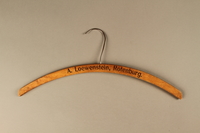
Wooden clothing hanger
Object
Bible
Object
"Kleine Bibel" a children's Bible carried by Ruth Loewenstein from Munich. The Loewenstein family: Willy (donor's father) [b. 1894], Annie [b. 1904], Ruth (donor) [b. 1929], and Marianne (donor's sister) [b. 1932], were able to leave Germany in August 1939 for England. valuables and used the money to rescue her parents from Germany.

